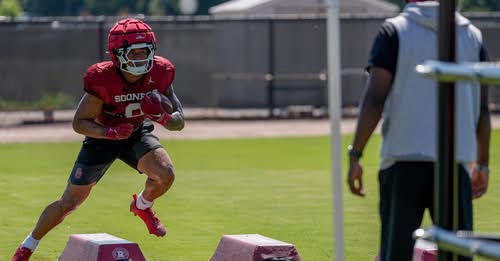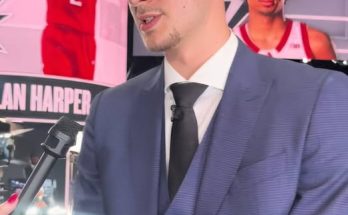The Oklahoma Sooners have long been known for their high-powered, explosive offenses, a tradition built under coaches like Lincoln Riley and perfected by quarterbacks such as Baker Mayfield, Kyler Murray, and Jalen Hurts. However, as the program transitions into the SEC, head coach Brent Venables has made it clear that the identity of this team is evolving. This season, the Sooners have revamped their offense to complement what is shaping up to be an ascending defense—a unit that has shown significant improvement under Venables’ leadership. Yet, despite these adjustments and the clear signs of progress, ESPN and other national media outlets remain skeptical of Oklahoma’s chances in the expanded College Football Playoff landscape.
For years, Oklahoma’s biggest weakness was its defense. While the Sooners could outscore nearly anyone, their inability to stop elite offenses in crucial moments—particularly in the College Football Playoff—often proved their undoing. Venables, a defensive mastermind who helped build Clemson’s dominant defenses during their championship runs, was brought in to change that. The process hasn’t been instantaneous, but the signs of growth are undeniable. Last season, Oklahoma’s defense showed flashes of being a formidable unit, particularly in games where they stifled opponents with aggressive play-calling and improved tackling. This offseason, Venables and his staff have doubled down on defensive recruiting, landing key transfers and high school prospects who fit their physical, fast-paced system.
At the same time, the offense—once the unquestioned focal point of the program—has undergone a subtle but important transformation. Gone are the days when the Sooners relied solely on a Heisman-caliber quarterback to carry them through shootouts. Instead, offensive coordinator Seth Littrell has implemented a more balanced approach, emphasizing a strong running game and efficient passing to control tempo and keep the defense fresh. Quarterback Jackson Arnold, a highly touted sophomore, has the talent to thrive in this system, but he won’t be asked to do it all alone. The Sooners have invested heavily in their offensive line and running back room, ensuring they can grind out tough yards when needed. This shift isn’t about abandoning their offensive roots but rather adapting to the realities of competing in the SEC, where physicality and defensive prowess often decide championships.
Despite these clear strategic adjustments, ESPN’s preseason rankings and playoff projections have been notably bearish on Oklahoma. Analysts point to the Sooners’ lack of a proven superstar at quarterback (Arnold is talented but unproven) and question whether the defense has truly closed the gap against elite competition. Some have even predicted a middle-of-the-pack finish in the SEC, suggesting that Oklahoma isn’t yet ready to compete with the likes of Georgia, Alabama, or Texas. This skepticism feels misplaced, especially given the program’s recent recruiting successes and Venables’ track record of building elite defenses.
One possible explanation for the doubt is the sheer depth of the SEC. With Texas joining the conference alongside Oklahoma, the league is more stacked than ever, and even improved teams might struggle to rise above the chaos. Additionally, Oklahoma’s recent playoff struggles—particularly their blowout losses to LSU and Georgia—have created a narrative that the Sooners can’t compete at the highest level. While that narrative is based on past performances, it ignores the structural changes Venables has implemented to ensure his team is built for sustained success.
Another factor is the uncertainty at quarterback. While Arnold has all the tools to be a star, he’s still young, and the SEC is unforgiving to inexperienced signal-callers. However, Oklahoma’s offensive system is designed to ease his burden, relying on a strong ground game and play-action passing to create manageable situations. If Arnold develops as expected, the Sooners could quickly silence their doubters.
Defensively, the pieces are in place for a breakout year. The defensive line, anchored by disruptive edge rushers and a deep rotation of interior linemen, should generate consistent pressure. The secondary, which has been a weak point in recent seasons, now features a mix of seasoned veterans and talented newcomers capable of holding their own against elite receivers. If this unit can stay healthy and continue to gel, Oklahoma could field its best defense in over a decade.
The schedule will provide plenty of opportunities to prove themselves. Early-season matchups against Tennessee and Texas will serve as litmus tests for whether the Sooners are truly ready to compete at an SEC level. A strong showing in those games could shift the national perception overnight.
So why doesn’t ESPN believe in Oklahoma? Part of it may be the natural bias toward established powers—Georgia, Alabama, and Ohio State have earned the benefit of the doubt, while Oklahoma is still seen as a program in transition. There’s also the fact that the Sooners haven’t yet beaten an elite team under Venables, though that opportunity will present itself this season.
Ultimately, the lack of preseason hype might work in Oklahoma’s favor. This team has the talent, coaching, and scheme to surprise people, and playing with a chip on their shoulder could fuel a special season. If the defense continues its upward trajectory and the offense finds the right balance between explosiveness and control, the Sooners could quickly go from underrated to undeniable.
The narrative around Oklahoma will change if they start winning big games. Until then, ESPN and others will remain skeptical. But for a program that has spent the past two years meticulously rebuilding its identity, that skepticism might just be the motivation they need. The Sooners aren’t the same team that relied solely on offense to carry them—they’re tougher, more balanced, and built for the grind of SEC football. And if the doubters don’t see that yet, they will soon enough.



